Eighteen University of Chicago faculty members have received distinguished service professorships or named professorships.
Profs. Omri Ben-Shahar, Michael Bourdaghs, Veronica Guerrieri, Guido Lorenzoni, Harold Pollack and Mauricio Tenorio have been named distinguished service professors. Profs. Adam Chilton, Yoonsun Choi, Henry Hoffmann, Hakan Karateke, Greg Kaplan, Derek Kennet, Bo Li, Joseph Masco, James T. Robinson, Emily Rogalski, Christopher Wild and Ce Zhang have received named professorships.
The appointments were effective Jan. 1, 2024, unless otherwise noted.
Division of the Biological Sciences
Emily Rogalski has been named the first Rosalind Franklin PhD Professor in the Department of Neurology. Rogalski joined UChicago in 2023 to lead the new University of Chicago Healthy Aging & Alzheimer's Research Care (HAARC) Center, which will bring together a wide range of scientists and health experts to accelerate breakthroughs in aging, dementia and cognitive resilience.
Rogalski is a clinical and cognitive neuroscientist, and her research uses a highly multidisciplinary approach to investigate two aging perspectives: primary progressive aphasia, in which neurodegenerative disease invades the language network, and “SuperAging,” in which individuals are seemingly resistant to the deleterious changes in memory associated with “normal” or more typical cognitive aging.
Her aphasia research focuses on characterizing the clinical and anatomical features of primary progressive aphasia, drivers of disease progression, identifying risk factors, and refining our understanding of language and network organization. She has also pioneered a line of care support research for individuals with dementia including the development of Communication Bridge, an intervention delivered via telemedicine focused on maximizing communication and quality of life for individuals with the condition and their care partners.
She operationalized the SuperAging phenotype and has helped to establish the unique biologic, molecular, genetic and psychosocial features associated with SuperAging. She leads an international study of SuperAgers that holds promise for identifying protective factors for avoiding Alzheimer’s disease, optimizing health span and reducing stigma and negative expectations associated with aging.
She is the recipient of several awards, including Crain’s Chicago Business ‘40 under 40’ and the Alzheimer’s Association Howie Dean Award.
Division of the Humanities
Michael K. Bourdaghs has been named the Robert S. Ingersoll Distinguished Service Professor in the Department of East Asian Languages and Civilizations and the College.
As a scholar of modern Japanese literature, literary and critical theory and music, Bourdaghs focuses on moving beyond the boundaries of Japan across multiple global networks for his research. He believes these dialogues fundamentally shape the meanings of the nation’s culture, literature and music. In his book “A Fictional Commons: Natsume Sōseki and the Properties of Modern Literature” (2021), recipient of an honorable mention for the 2023 John Whitney Hall Prize from the Association of Asian Studies, Bourdaghs re-examines the fiction and critical essays of Sōseki as they relate to ideologies of modern property ownership.
In the realm of Japanese popular music from 1945 to the early 1990s, in “Sayonara Amerika, Sayonara Nippon: A Geopolitical Pre-History of J-Pop” (2012) he analyzes how songs performed by Kasagi Shizuko, Sakamoto Kyū and the Yellow Magic Orchestra engaged creatively with the shifting historical context of Japan’s Cold War. His current research project, for which Bourdaghs received a 2019 Guggenheim Fellowship, reconsiders Japanese culture during the Cold War era. Bourdaghs seeks to look beyond U.S./Japan bilateral relations to consider how Japanese writers, filmmakers and musicians participated in multiple Cold War networks. These include the First World of capitalist liberal democracies, the Second World of the socialist bloc and the Third World of the decolonization movement.
Hakan Karateke has been named the Kanuni Süleyman Professor in Ottoman and Modern Turkish Studies in the Department of Near Eastern Languages and Civilizations and the College.
A cultural historian of the Ottoman Empire and modern Turkey, Karateke often explores the realms where philology and literary history intersect in his research. In “The Ottoman World: A Cultural History Reader. 1450–1700” (2021), co-authored with Helga Anetshofer at UChicago, Karateke shares a wide range of voices from Ottoman society for teachers and students, spanning many individuals and providing insights into everyday life. The collection includes texts from ordinary people originally written in Ottoman Turkish, Arabic, Armenian, Greek, Hebrew, Italian and Persian languages. The book accelerates the move away from a state-centered approach to Ottoman history.
Currently, Karateke is working on a project called “Ottoman Turkish: The Cultural History of a Language,” in which he aims to narrate the history of the language by exploring and reconstructing the changing perceptions of the Turkish language over several centuries. Karatake is the editor for the “Ottoman and Turkish Studies” book series at Academic Studies Press and co-editor for “The Ottoman Empire and its Heritage” series at Brill Academic Publishers.
Christopher J. Wild has been named the Peter B. Ritzma Professor in the Department of Germanic Studies and the College.
His wide-ranging scholarship covers the intersection of literature, theater, history, philosophy and religion from the Reformation to the early 19th century in Germany and beyond. In his research, Wild considers the role and impact of religious thought and practice in processes and phenomena considered genuinely modern and secular. On the other hand, he analyzes the mediality and formal semantics of European and German theater from its start in ancient Greece through modernism.
In his first book, “Theater der Keuschheit—Keuschheit des Theaters, Zu einer Geschichte der (Anti-)Theatralität von Gryphius bis Kleist” (2003), Wild’s research interests converged as he investigated how religious sentiment influenced the historical transformation of German theater from the Baroque to Classicism. His book “Descartes’ Meditative Turn: Cartesian Thought on Spiritual Practice,” to be published in March 2024 by Stanford University Press, explores why Descartes borrowed his title for his most important work from a religious genre and how his philosophical reasoning can be considered meditative. Currently, Wild is working on a book project examining how the reform of religious media launched by Martin Luther and others paved the way for modern media technologies and practices.
Division of the Physical Sciences
Henry Hoffmann has been named the Liew Family Chair and Professor in the Department of Computer Science and the College.
Hoffmann leads the Self-aware computing group at UChicago and conducts research on adaptive techniques for power, energy, accuracy, security, and performance management in computing systems. He co-founded Config Dynamics, LLC in 2019 to pursue commercial opportunities for self-aware computing. He has spent the last 22 years working on multicore architectures and system software in both academia and industry. He also founded the UChicago CS department's EDI committee in 2020.
He completed a PhD in Electrical Engineering and Computer Science at MIT where his research on self-aware computing was named one of ten "World Changing Ideas" by Scientific American in December 2011. He received his SM degree in Electrical Engineering and Computer Science from MIT in 2003. As a Masters student he worked on MIT's Raw processor, one of the first multicores. Along with other members of the Raw team, he spent several years at Tilera Corporation, a startup which commercialized the Raw architecture and created one of the first manycores. His implementation of the BDTI Communications Benchmark (OFDM) on Tilera's 64-core TILE64 processor still has the highest certified performance of any programmable processor.
Hoffmann received the Presidential Early Career Award for Scientists and Engineers (PECASE) in 2019 and the Department of Energy Early Career Award in 2015. He is a member of the Samsung Security Hall of Fame and of the ASPLOS Hall of Fame. He has a Test of Time Honorable Mention from FSE 2021 for his work on Loop Perforation and approximate computing.
Bo Li has been named the first Neubauer Associate Professor of Data Science in the Department of Computer Science and the College.
Li’s research addresses trustworthy machine learning from both theoretical and practical aspects and aims to enable reliable machine learning algorithms and systems in the real world, such as safe autonomous vehicles, federated (distributed) learning, and trustworthy large language models. She focuses on several interconnected aspects, such as robustness, privacy, generalization, and their underlying connections.
She been recognized by a long list of notable awards and fellowships for young faculty. She is a Sloan Fellow, MIT Technology Review TR-35 innovator, and recipient of the IJCAI Computers and Thought Award, NSF CAREER, Intel Rising Star Faculty award, Symantec Research Labs Fellowship, Dean's Award for Excellence in Research, C.W. Gear Outstanding Faculty Award, Rising Stars in EECS, Research Awards from Amazon/Facebook/Google, and best paper awards at multiple top machine learning and security conferences.
Her research has been featured by major publications and media outlets such as Nature, Wired, New York Times, Fortune, and is on display at the Science Museum in London.
Ce Zhang has been named the first Neubauer Associate Professor of Data Science in the Department of Computer Science and the College, effective July 1, 2024.
Zhang is currently the CTO of Together, building a cloud platform for artificial intelligence. Before that, he was an associate professor of computer science at ETH Zurich. His research looks at the fundamental tension between data, model, computation and infrastructure, with the final goal of democratizing machine learning and artificial intelligence. His current research focuses on building next-generation machine learning platforms and systems that are data-centric, human-centric, and declaratively scalable.
Before joining ETH, Zhang finished his Ph.D. at the University of Wisconsin-Madison and spent another year as a postdoctoral researcher at Stanford University.
His work has received recognitions such as the SIGMOD Best Paper Award, SIGMOD Research Highlight Award, Google Focused Research Award, an ERC grant, and has been featured and reported by Science, Nature, the Communications of the ACM, and various media outlets such as Atlantic, WIRED, Quanta Magazine, etc. He also currently serves as the co-editor-in-chief of DMLR, a new member of the JMLR family focusing on data-centric machine learning research.
Division of the Social Sciences
Greg Kaplan has been named the Alvin H. Baum Professor in the Kenneth C. Griffin Department of Economics and the College.
Kaplan is a leading applied economist focusing primarily on macroeconomics and household behavior, whose findings have attracted significant attention in academic and policy circles. He has published extensively on the topics of monetary and fiscal policy, risk sharing, inequality, unemployment, household formation, migration and consumer spending.
Kaplan’s research has established the existence and importance of wealthy hand-to-mouth households in the United States. These households, accounting for about a quarter of total US households, own substantial illiquid assets but few liquid assets, resulting in consumption that closely tracks income despite high net worth. Since these wealthy hand-to-mouth households represent a significant share of aggregate consumption, they have major macroeconomic implications that Kaplan has explored in Heterogeneous Agent New Keynesian (HANK) models.
Joseph Masco has been named the Samuel N. Harper Professor in the Department of Anthropology and the College.
An internationally recognized scholar operating in the intersections of science studies, anthropology and American culture, Masco’s contributions to our understanding of the imbrication of technoscientific revolution, existential risk and national security have unfolded across a trio of books: the award-winning “The Nuclear Borderlands: The Manhattan Project in Cold War New Mexico” (2006); “The Theater of Operations: National Security Affect from the Cold War to the War on Terror” (2014); and “The Future of Fallout, and Other Episodes in Radioactive Worldmaking” (2021).
Marked by a keenly sensitive attention to materiality, affect and psychosocial meaning, Masco’s work has brought international recognition. His latest publications include an edited volume with Deborah Thomas, “Sovereignty Unhinged: An Illustrated Primer for the Study of Present Intensities, Disavowals and Temporal Derangements” (2023), and a co-edited volume with Lisa Wedeen, “Conspiracy/Theory” (2024), which considers the stakes of epistemology in an age of disinformation and polarization. His work continues via a long-running project at the Neubauer Collegium on “Engineered Worlds,” a collaboration focused on planetary scale environmental emergency.
Masco’s work has been supported by the American Council of Learned Societies, The John D. and Catherine T. MacArthur Foundation, the National Endowment for the Humanities and The Wenner-Gren Foundation. He has been a residential fellow at the School for Advanced Research, held a Benjamin Meaker Visiting Professorship at the Institute for Advanced Study (University of Bristol) and has been a member of the Institute for Advanced Study (Princeton). In 2017, he was awarded a Faculty Award for Excellence in Graduate Teaching and Mentoring at the University of Chicago.
Mauricio Tenorio has been named the Gustavus F. and Ann M. Swift Distinguished Service Professor in the Department of History and the College.
A prolific author of 15 books and well over 50 papers, many of them with top academic publishers and journals, Tenorio is recognized for his extraordinary range of expertise as well as his unparalleled originality as a thinker. His first book, “Mexico at the World’s Fairs: Crafting a Modern Nation” (1996), set the tone by opening with remarks about how “A Thousand and One Nights” might be seen as a model for historical narrative, given the “chaos” that the historian is presented with by actuality.
Tenorio’s succeeding works on the history of cities, languages, and conceptions of history—from “‘I Speak of the City’: Mexico City at the Turn of the Twentieth Century” (2013) to “Clio´s Laws: On History and Language” (2019), among others—have similarly shown a remarkable ability to link the whimsical to the profound, the psychological to the sociological, and the intimately particular to the universal.
Booth School of Business
Veronica Guerrieri has been named the Ronald E. Tarrson Distinguished Service Professor of Economics.
The Williard Graham Faculty Scholar at Chicago Booth, she is also a fellow of the Econometric Society, a research associate at the National Bureau of Economic Research, a research fellow at the Center for Economic Policy Research, and the co-director of the Macro Initiative of the Becker Friedman Institute. Guerrieri was a managing editor of the Review of Economic Studies in 2017-2021. She is also a consultant at the Federal Reserve Bank of Chicago and in 2021 she has been a consultant for the Italian Prime Minister. Guerrieri’s work focuses on macroeconomics, labor and financial markets, business cycles, and growth.
She won the Bernácer Prize in 2015 for the best European economist under 40 in macroeconomics and finance, the Carlo Alberto medal in 2013 for the best Italian economist under 40, the Alfred P. Sloan Research Fellowship in 2011, and the Excellence Award in Global Economic Affairs in 2010 from the Kiel Institute for the World Economy.
Guido Lorenzoni has been named the first Robert W. Fogel Distinguished Service Professor.
His fields of research are macroeconomics and international finance. His work has focused on various innovations in macro modeling motivated by current events. He has worked on building models with heterogeneous consumers to interpret the Great Recession and to study the effect of house price cycles on aggregate activity. He also worked on models of sovereign debt applied to the Euro crisis, and on multi-sector models applied to the effect of the Covid pandemic on the US economy and on the post-pandemic recovery. His most recent work focuses on interpreting recent inflation dynamics and on the connection between distributional conflict and the inflation experience.
Lorenzoni is also a research associate at the National Bureau for Economic Research and a consultant for the Federal Reserve Bank of Chicago. Before joining the UChicago faculty, he worked at Princeton, MIT and Northwestern. He received the Alfred P. Sloan Research Fellowship and is an elected fellow of the Econometric Society. He is a co-editor of the Journal of the European Economic Association and an associate editor of the American Economic Review. In 2021 he served as consultant for the Italian PM Mario Draghi.
Crown Family School of Social Work, Policy, and Practice
Yoonsun Choi has been named the Mose J. and Sylvia Firestone Professor in the Crown Family School of Social Work, Policy, and Practice and the College.
Choi is the director of the Doctoral Program at Crown and a fellow of the American Academy of Social Work and Social Welfare. She served as the Vice President of the Society for Social Work and Research and as the Chair of the Asian Caucus of the Society for Research on Child Development. Choi has led the Midwest Longitudinal Study of Asian American Families (MLSAAF), a longitudinal survey research following about 800 Filipino- and Korean-American families since 2014 to identify multiple developmental trajectories of young Asian Americans. Having started when the participants were adolescents who are now young adults, the study will follow them into their late twenties. Choi’s scholarship is particularly interested in the role of culture in family (such as culturally unique family processes and intergenerational cultural conflict), racial prejudice and discrimination, ethnic/racial identity, culture change and formation (acculturation), and the intersection of culture and socioeconomic class that may be unique issues for ethnic/racial and cultural minority and immigrant/migrant youth.
Harold Pollack has been named the Helen Ross Distinguished Service Professor in the Crown Family School of Social Work, Policy, and Practice, the Department of Public Health Sciences, and the College.
Pollack’s research seeks to understand how to improve services and interventions for people who live with psychiatric or substance use disorders, and services for people who live with physical and intellectual disabilities. The faculty co-director of the University of Chicago Urban Health Lab, Pollack has authored 190 academic publications, and has served on four committees of the National Academies of Sciences, Engineering and Medicine. A member of the UChicago faculty since 2003, he regularly advises local, state and federal officials concerning criminal justice, disability and public health policy.
His recent intervention trials explore the effectiveness of linkage interventions for returning citizens living with opioid and stimulant use disorders, interventions to reduce the risk of violent encounters between Chicagoans living with serious mental illness and emergency first-responders, and school-based interventions to improve mental health among Chicago youth. A frequent contributor to popular media on matters related to public health policy, Pollack is co-author of the best-selling book: “The Index Card: Why Personal Finance doesn’t Have to be Complicated.”
Divinity School
James Theodore Robinson has been named the Nathan Cummings Professor in the Divinity School and the College.
Robinson is dean of the Divinity School, a role in which he has served since 2021. He is also appointed in the Program on Medieval Studies, Religious Studies, Fundamentals: Texts and Issues, and the Joyce Z. and Jacob Greenberg Center for Jewish Studies, and he is an affiliated member in the Department of Near Eastern Languages and Civilizations. Robinson's research focuses on medieval Jewish intellectual history, philosophy, and biblical exegesis in the Islamic world and in Christian Europe; his main scholarly interests lie in the literary and social dimensions of philosophy and the relation between philosophy and religion.
He is the author of four books and three edited volumes; the most recent of which is “Maimonides’ Guide of the Perplexed in Translation: A History from the Thirteenth Century to the Twentieth” (The University of Chicago Press, 2019), for which he served as co-editor. Known for teaching a wide range of courses, he was a 2017 recipient of the UChicago Faculty Award for Excellence in Graduate Teaching and Mentoring.
Institute for the Study of Ancient Cultures
Derek Kennet has been named as the first Howard E. Hallengren Professor of Arabian Peninsula and Gulf States Archaeology in the Institute for the Study of Ancient Cultures, Department of Near Eastern Languages and Civilizations, and the College.
Kennet is an archaeologist who works on the Arabian Peninsula and surrounding regions. He approaches the peninsula from several perspectives, such as: longue durée regional archaeology; the archaeology of the Late Antique period, the rise of Islam and the Islamic periods; human economic strategies in semi- to hyper-arid environments; and interaction between the Arabian Peninsula and surrounding regions.
He has been involved in archaeological fieldwork in many countries, including Italy, Bulgaria, Syria, Jordan, Cyprus, Egypt and Libya, as well as (in the Arabian Peninsula) Oman, the UAE, Kuwait and Saudi Arabia. He has also directed research projects in India and China. In the early 1990’s, he held the post of Resident Archaeologist at the National Museum of Ras al-Khaimah (UAE) before moving to the Department of Archaeology at Durham University in the U.K. for 25 years, spending two years teaching in the Department of Archaeology at Sultan Qaboos University in Oman. He moved to Chicago in 2024.
Kennet has published in numerous academic journals and conference proceedings. His most recent books include “Excavations at Paithan, Maharashtra: Transformations in Early Historic and Early Medieval India” (with M. Kasturi Bai and J.V.P. Rao, 2020) and “Sasanian and Islamic settlement and ceramics from Southern Iran 4th – 17th century AD: the Williamson Survey” (with Seth Priestman, 2023). “The Bronze Age communal graves of Qarn al-Harf, Ras al-Khaimah (UAE): Southeast Arabia at the dawn of the second millennium” (with A. Caine, A. Hilton, C. Velde, L. Weeks and others) is expected to publish in 2024.
Law School
Omri Ben-Shahar has been named the Leo and Eileen Herzel Distinguished Service Professor.
Ben-Shahar is the Kearney Director of the Coase-Sandor Institute for Law and Economics at the Law School, where he teaches contracts, sales, trademark law, insurance law, consumer law, sales law, e-commerce, food law, law and economics, and game theory and the law. His primary interests lie in contract law, consumer protection, and law and technology—fields he has written on extensively. He is the co-author of Personalized Law: Different Rules for Different People (2021, with Ariel Porat) and More Than You Wanted to Know: The Failure of Mandated Disclosure (2014, with Carl Schneider). He also is the co-reporter for the American Law Institute’s Restatement of Consumer Contracts.
Before coming to UChicago, Ben-Shahar was the Kirkland & Ellis Professor of Law and Economics at the University of Michigan. Prior to that, he taught at Tel-Aviv University, was a member of Israel's Antitrust Court and clerked at the Supreme Court of Israel.
Adam Chilton has been named the first Howard G. Krane Professor.
Many of Chilton’s research projects focus on how law can promote economic, social and political development around the world. His book with co-author Mila Versteeg, How Constitutional Rights Matter (2020), won the Best Book Prize from the International Society of Public Law and from the Human Rights Section of the American Political Science Association. Chilton also has ongoing projects focused on documenting the development and enforcement of competition law regimes around the world, studying how Bilateral Labor Agreements can be used to promote international labor migration, and researching how to improve the quality of life in informal urban communities.
In addition to these international and comparative projects, Chilton engages in research topics that include reforming the U.S. Supreme Court, measuring the ideology of the American legal profession, studying the determinants of judicial decision making, and improving legal education and the legal academy. He also serves as a co-editor of the Journal of Law and Economics.
Before joining the UChicago faculty, he taught at the Law School as a Bigelow Fellow and Lecturer in Law.
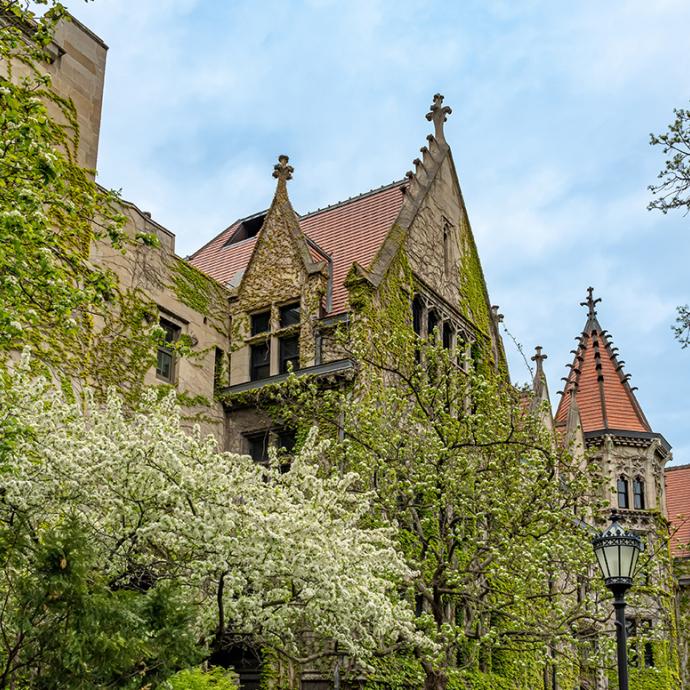
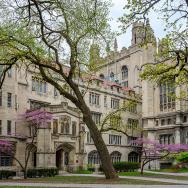
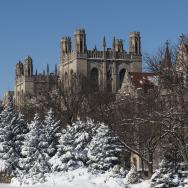

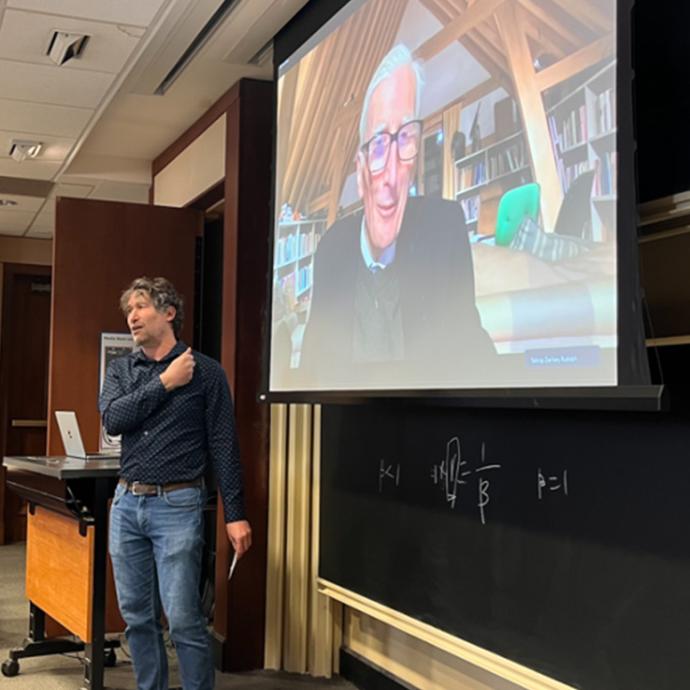
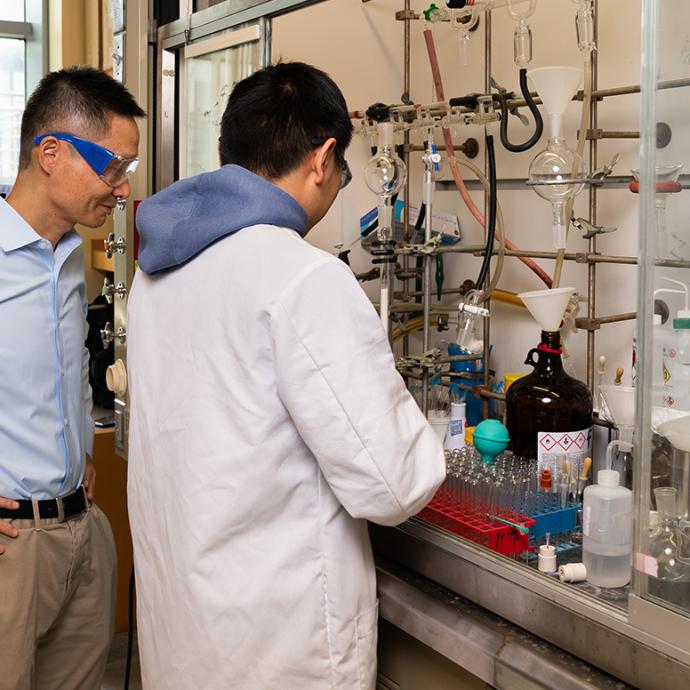

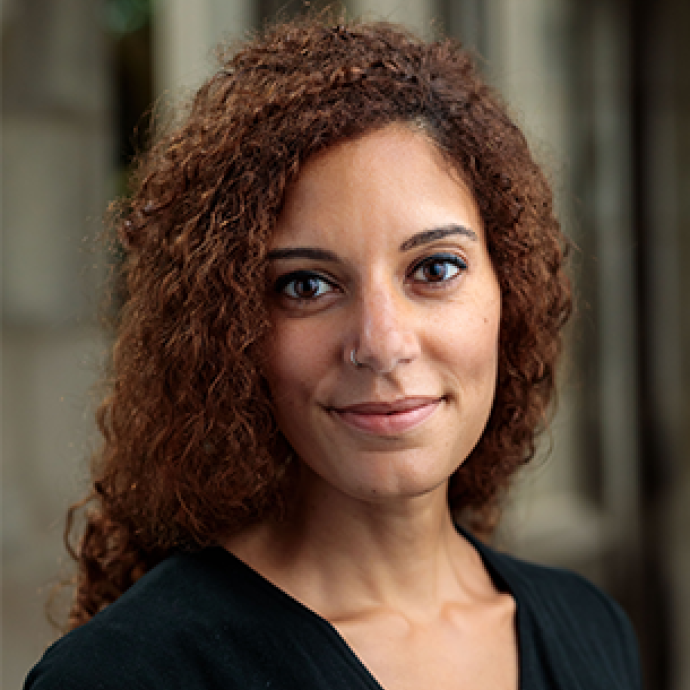
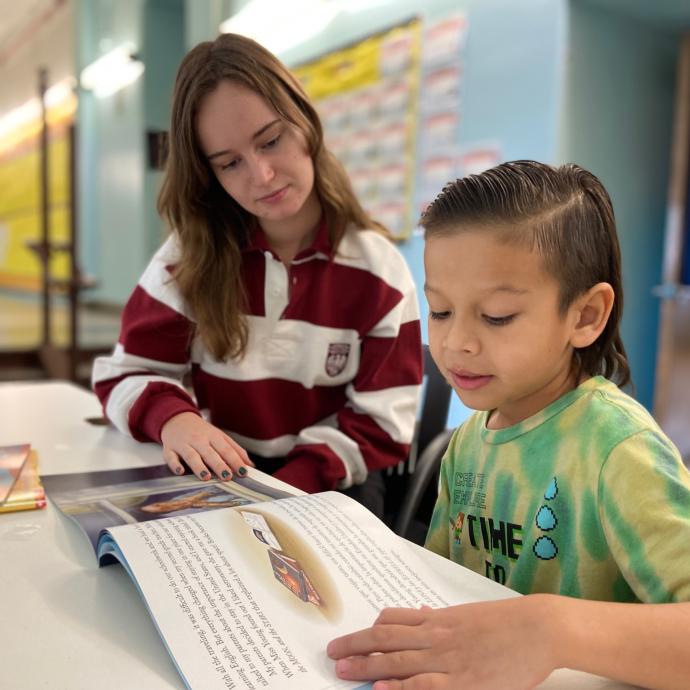



 —Prof. Chuan He
—Prof. Chuan He
